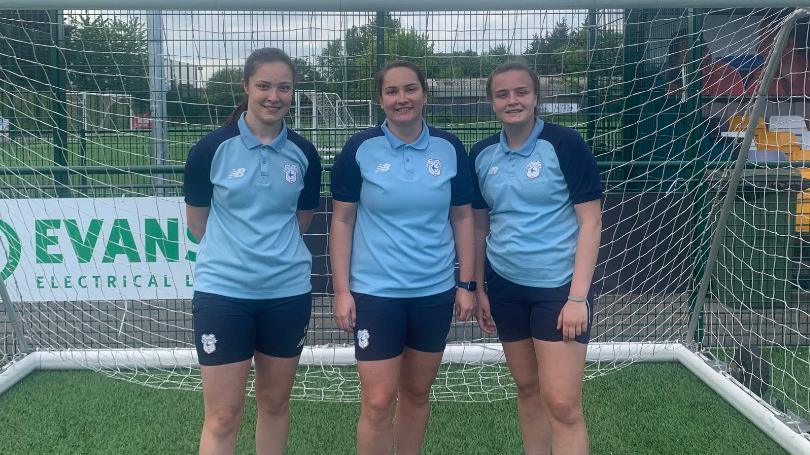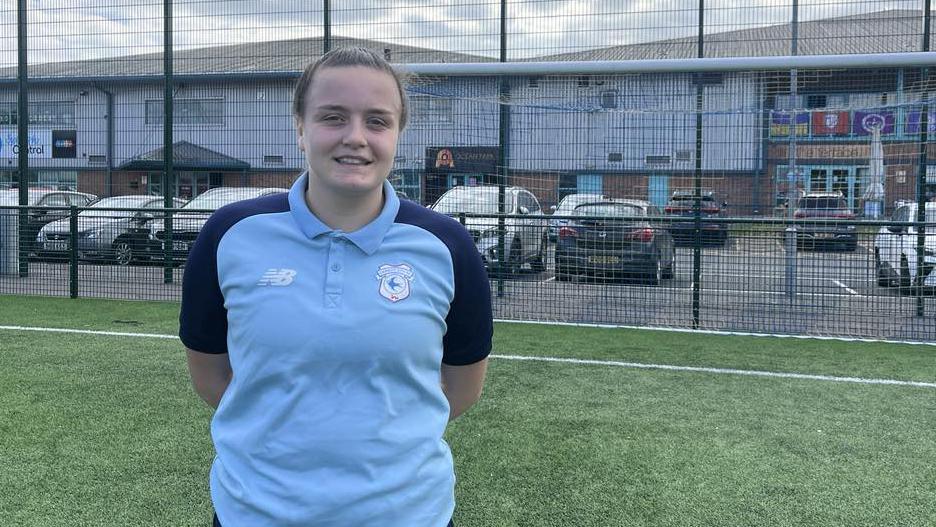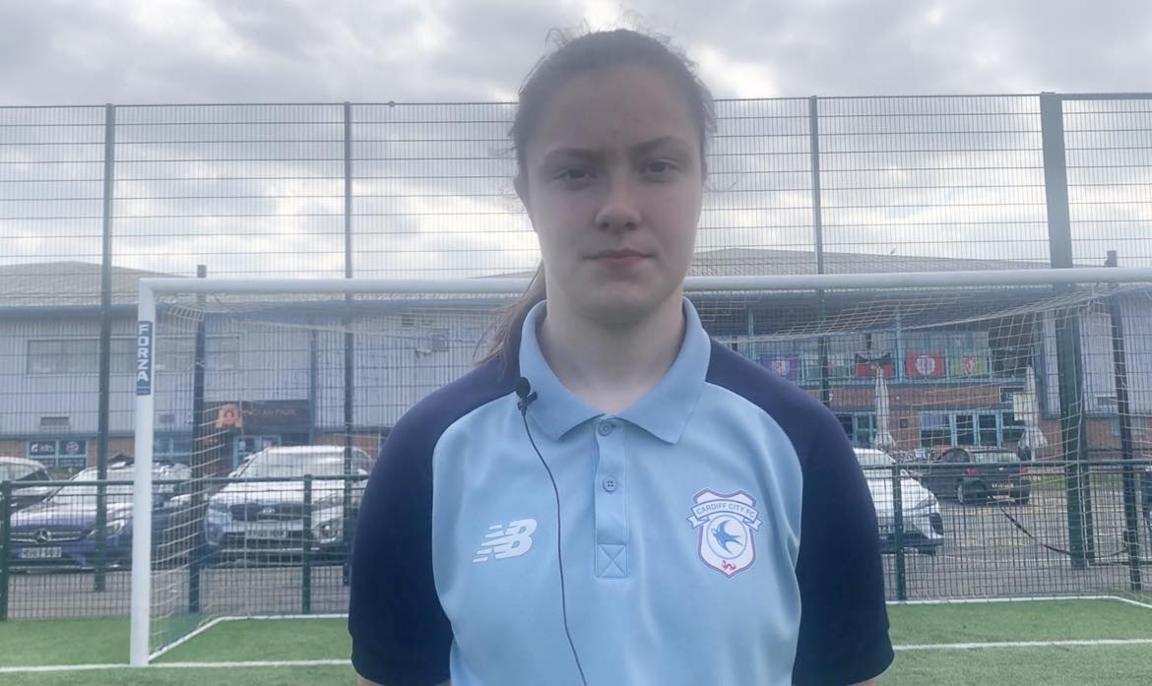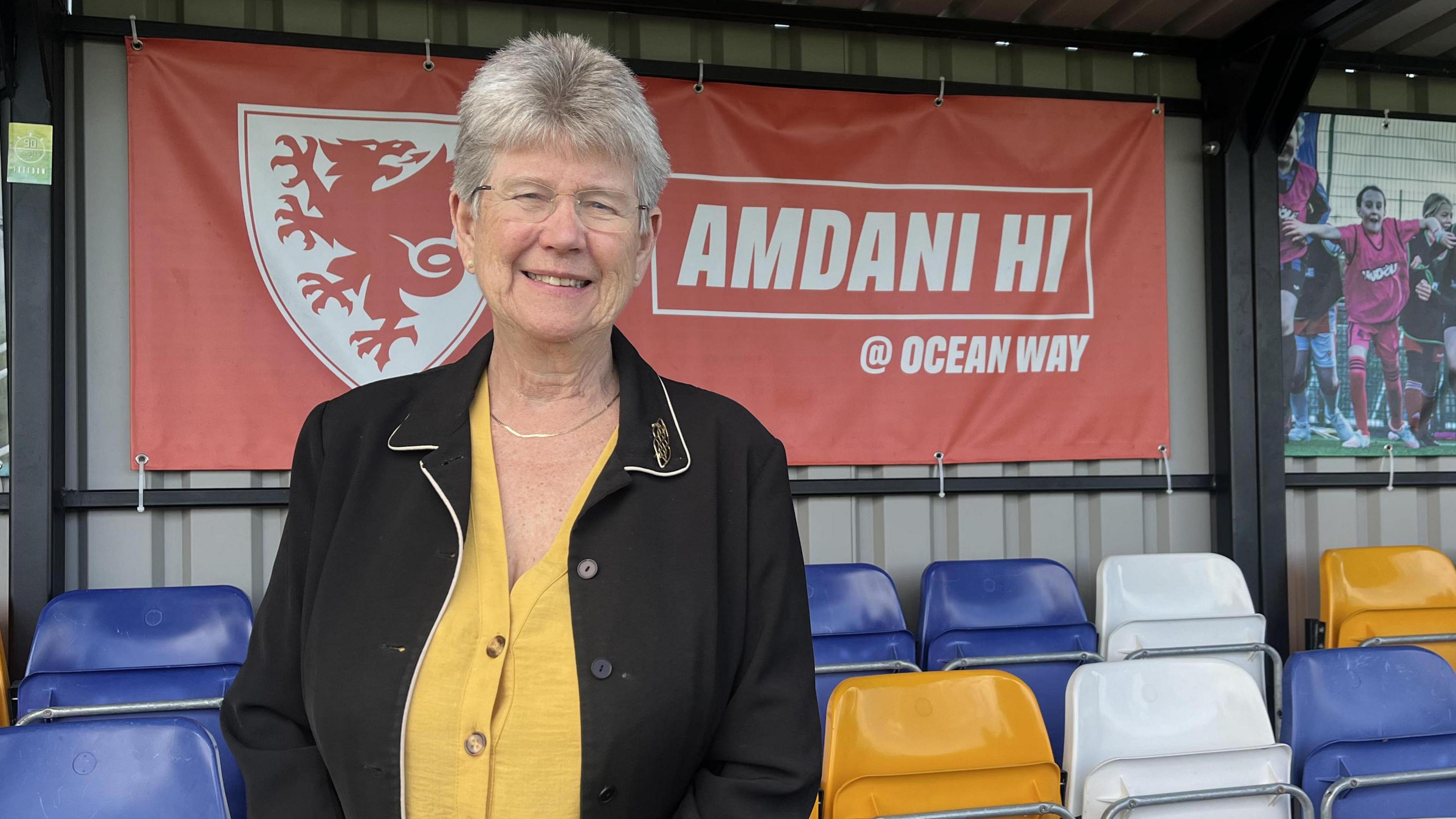How removing period stigma empowers footballers

Cardiff City players say feeling comfortable and confident when on their periods makes a huge difference to their sporting performance
At a glance
Cardiff City Women say their purpose-built facilities "empower" them to feel confident playing while on their period
The players say the open conversation is breaking the taboo around participating in sport while menstruating
But they believe there is a long way to go in making welcoming environments accessible across Wales
- Published
Proper period provision “empowers” young people to stick with sports, football players have said.
Women playing for Cardiff City said their purpose-built facilities were “game-changing”, but said more should be done to achieve equal access across the country.
First team players said menstruation within sport had gone from being a “taboo” topic to an “open, honest conversation”.
The Welsh government has so far spent £12m on an initiative to destigmatise periods and provide sanitary products to whoever needs them.
Poor period provision for women's sport criticised
- Published10 February 2023
The fear of heavy periods and cream furniture
- Published4 October 2022
A further £24m has been set aside for Sport Wales over the next three years to develop inclusive facilities across Wales.
Cardiff City Women use the 'Amdani Hi @ Ocean Way' hub, which has unisex changing facilities with cubicles and free sanitary products.
‘It’s always in the back of your mind’
Defender Hollie Smith said: “I started off in a boys’ team, so being the only girl there with male coaches, you do feel a bit isolated.
“You’re running around, and there is the massive possibility for accidents. It’s always in the back of your mind, 'have I leaked?’”
The 19-year-old student added that as her career progressed the stigma began to fall away.
“It used to be quite taboo but now, in our team, people will just shout in the changing room, ‘has anyone got a tampon?’
“It’s going to help the younger girls coming up to feel less worried.”

Hollie Smith says the worry about leaking through football shorts when on your period is "always on your mind"
Megan Bowen, 17, added: “There’s a lot of self-consciousness around when you’re on your period. You’re in the public eye when you’re playing sport.
“I deal with quite bad pains in my back and stomach and I have to make coaches aware because my performance on that day may not be up to scratch.
“In the league we’re in, most coaching staff are male. That’s how it is. So you have to be comfortable enough to tell them.
“It’s about giving people a chance to speak about it, in an open and honest environment.”
Ms Bowen said that it was not just the physical symptoms of menstruation that needed to be considered, but the mental health side of things too.
“You’re always looking on your app [and thinking]: ‘It’s coming up in two days, how is it going to affect me?’
“That needs to be talked about. You might be grumpy one day, but there’s reasoning behind it and I think as long as people understand that, then we’re getting somewhere.”

Megan Bowen says lack of sanitary bins is a "major concern" when travelling to away matches
Kit which allows players to feel confident is another major consideration.
Ms Smith said: “Choice is vitally important.
“Our away kit this season was a very light pink, which is basically white. We all know white when you’re on your period is a bit of a risky colour.”
She added: “Last season we had all men’s kit, this season it’s been women’s kit. It suits a lot of people and doesn’t suit other people. So from next season we’ve got the choice.
“If you feel comfortable when playing, that’s when you’re going to play your best.”
‘Players are pulling out on game day’
Ms Bowen said she thought the situation had improved - citing Swansea’s switch from white shorts to black as an example - but said things were far from perfect.
“There’s still many clubs where players are struggling, players are pulling out on game day because they physically can’t cope,” she said.
“And I think this shouldn’t be something normal just because it happens once a month.”
The players said there was still a lot of work to be done, particularly at grassroots and lower league clubs.
“That’s where you get the issues of the facilities feeling unwelcoming, like you don’t belong there,” said Ms Smith.
She described one away game where the “changing rooms were cramped, you could tell the showers were designed for males, there were no bins in the toilets”.
Ms Bowen added: “There’s a lot of places that don’t have the sanitary bins and that’s a major concern.
“You might not see it, it might just be in the corner of the toilet, but knowing it’s there makes you feel more comfortable.
“I think that needs to be dealt with."

Social justice minister Jane Hutt says the Welsh government hopes to "lead the way" in attitudes towards periods in sport
Welsh government social justice minister, Jane Hutt, said the Period Proud initiative aimed to reach “every part of society”.
“It’s important that having a period isn’t an obstacle to taking part in sport,” she said.
Ms Hutt said the Welsh government would be “evaluating and learning” throughout the initiative.
She added: “It’s public money, but it’s not all about money it’s also about changing attitudes and [promoting] healthy, respectful relationships.
“If we can’t get it right in sport, we are going to be losing out so much in terms of talent. Hopefully, we can lead the way here in Wales.”
Lowri Roberts, head of women and girls’ football at the Football Association of Wales (FAW), said discussing periods was crucial to help players “achieve their potential”.
She said the organisation had seen an 89% increase in women and girls participating in the sport over the past five years.
“It’s traditionally quite a taboo subject, where people feel ashamed to talk about it. So it’s about shifting that narrative,” she said.
“By creating an environment here with incredible role models from Cardiff City, young girls are growing up seeing girls who are confident about talking about periods.”